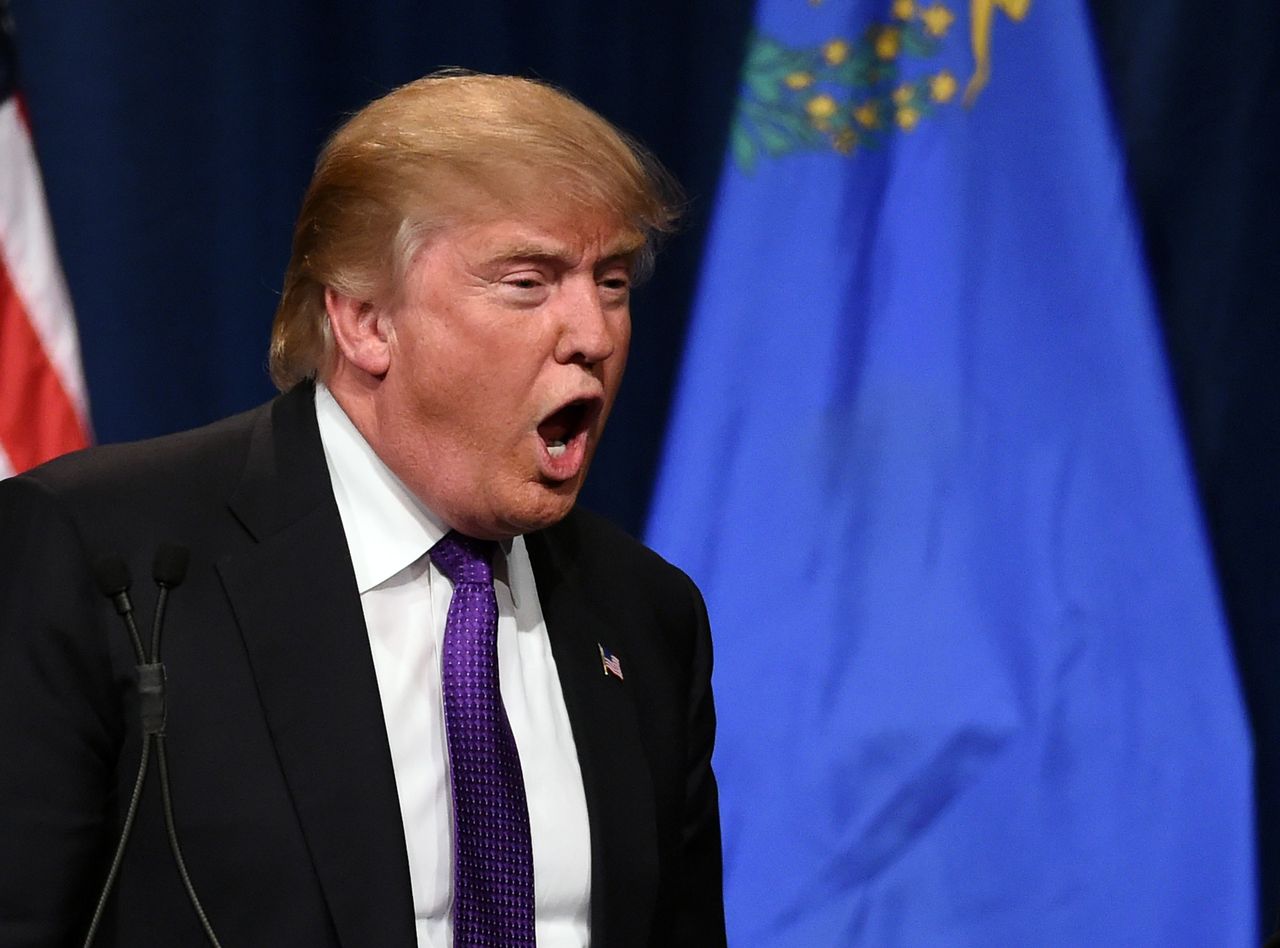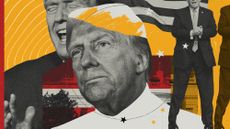The terror and madness of Trump's wild threats against Iran
It's time to take away the president's nukes


The president of the United States has now, twice in the span of 18 months, unsubtly threatened genocidal violence against another country.
Let's not mince words here: Nuclear weapons are designed to inflict genocidal levels of destruction and death. They are a weapon to be used as a last resort, if that, to ensure national survival. They are not meant to be used casually — either as a weapon, or rhetorically. Not even implicitly.
But President Trump keeps doing exactly that.
Subscribe to The Week
Escape your echo chamber. Get the facts behind the news, plus analysis from multiple perspectives.

Sign up for The Week's Free Newsletters
From our morning news briefing to a weekly Good News Newsletter, get the best of The Week delivered directly to your inbox.
From our morning news briefing to a weekly Good News Newsletter, get the best of The Week delivered directly to your inbox.
The latest threat came late Sunday night, in an unhinged-sounding all-caps tweet that almost immediately ranks — along with Ronald Reagan's "we begin the bombing in five minutes" gaffe and JFK's Cuban Missile Crisis speech to the nation — as among the more alarming presidential communications in history.
Trump wrote: "To Iranian President Rouhani: NEVER, EVER THREATEN THE UNITED STATES AGAIN OR YOU WILL SUFFER CONSEQUENCES THE LIKES OF WHICH FEW THROUGHOUT HISTORY HAVE EVER SUFFERED BEFORE. WE ARE NO LONGER A COUNTRY THAT WILL STAND FOR YOUR DEMENTED WORDS OF VIOLENCE & DEATH. BE CAUTIOUS!"
This is utterly terrifying.
Rouhani's offending threat came in a speech on Sunday to Iran's diplomats, in which Rouhani warned America, essentially, not to meddle in Iran's affairs. "America should know that peace with Iran is the mother of all peace, and war with Iran is the mother of all wars," Rouhani said. It wasn't a pledge of nonviolence, certainly, but it wasn't an offensive threat, either. Instead, it was a warning of the kind that nations routinely make when they perceive threats gathering against them.
Trump's response was wildly dangerous.
First of all, Trump escalated. He didn't merely threaten Iran not to mess with the United States: He warned of "consequences the likes of which few throughout history have ever suffered." That's not an explicit reference to nuclear weapons, but it doesn't have to be: Given how few times nuclear weapons have been used in anger, that's precisely how Trump's threat will be received.
Trump also set the bar for U.S. action far too low.
Read his tweet again, in a more-silent voice: "We are no longer a country that will stand for your demented words of violence and death." Words. Trump is suggesting to the world that he's willing to go to war with Iran because Iran's leaders say hurtful or scary things. That is not even close to a good reason to go to war.
This isn't the first time Trump has done this, of course. Last year, he threatened "fire and fury" against North Korea, another explicitly implicit warning of nuclear war. That Trump now seems to be insisting he's achieved a peaceful solution to the crisis there should give us little consolation: At the moment he tweeted, it seemed to move America closer to a shattering war desired by few outside the Oval Office. So it would also seem with Trump's Sunday night tweet against Iran.
Again: Presidents don't — and shouldn't — make threats of nuclear war casually. Reagan's "bombing" joke was supposed to be off-the-record, not meant for public consumption, and it was treated as an international crisis. When Kennedy warned the Soviets against placing missiles in Cuba, signaling U.S. readiness to go to war, he still pleaded 10 different ways for peace.
"We have no wish to war with the Soviet Union — for we are a peaceful people who desire to live in peace with all other peoples," Kennedy said. He meant it: Peace prevailed. Trump, it seems likely, would consider such a statement a sign of weakness.
Trump's threat comes in a much larger context than the U.S. relationship with Iran: This tweet comes a week after his disastrous Helsinki press conference with Vladimir Putin, a week in which even members of his own party have warned against Trump's penchant for buttering up dictators while undermining American alliances. Simply put: He looks less like a protector of the United States than he did last month. It's impossible not to wonder if he's feeling extra motivation to act like a tough guy.
There's another context for Trump's threat: A growing sense that it's wrong for any president of the United States — be it Trump or Barack Obama, Democrat or Republican — to have unlimited command over the nation's nuclear weapons.
As is, Trump could, on his own authority, choose to start a nuclear genocide on a whim — and there's almost nothing in American law or the chain of command to stop him or even slow him down.
It's time for that to change.
Trump may be commander in chief of the armed forces, but it is Congress' responsibility under the Constitution to declare war. The legislative branch has largely shirked that responsibility in the post-World War II era, but Trump's tweets are one signal among many that it's time to re-engage.
Earlier this year, Sen. Ed Markey (D-Mass.) and Rep. Ted Lieu (D-Calif.) sponsored legislation requiring the president to receive congressional approval before initiating a first-use nuclear strike. "No one person should have the power to decide when the U.S. will be the first to use nuclear weapons," Markey declared on Twitter.
He's right. It's also true that no one person should have the power to threaten the use of U.S. nukes in willy nilly fashion, as President Trump has done. Nukes are too dangerous, the mere threat of their use has the potential to unleash instability throughout the world. Trump's threat doesn't make America safer, nor does it feel safer: Instead, his casual threats raise fears of a return to the bad old days of the Cold War, when the possibility of the end of the world loomed constantly in the background.
The best way to put a leash on Trump's wild threats is for Congress to assert its authority. The time to act, clearly, is now.
Sign up for Today's Best Articles in your inbox
A free daily email with the biggest news stories of the day – and the best features from TheWeek.com
Joel Mathis is a writer with 30 years of newspaper and online journalism experience. His work also regularly appears in National Geographic and The Kansas City Star. His awards include best online commentary at the Online News Association and (twice) at the City and Regional Magazine Association.
-
 Why does Elon Musk take his son everywhere?
Why does Elon Musk take his son everywhere?Talking Point With his four-year-old 'emotional support human' by his side, what message is the world's richest man sending?
By Rebekah Evans, The Week UK Published
-
 The Week Unwrapped: Why are sinkholes becoming more common?
The Week Unwrapped: Why are sinkholes becoming more common?Podcast Plus, will Saudi investment help create the "Netflix of sport"? And why has New Zealand's new tourism campaign met with a savage reception?
By The Week UK Published
-
 How Poland became Europe's military power
How Poland became Europe's military powerThe Explainer Warsaw has made its armed forces a priority as it looks to protect its borders and stay close to the US
By Elizabeth Carr-Ellis, The Week UK Published
-
 'Seriously, not literally': how should the world take Donald Trump?
'Seriously, not literally': how should the world take Donald Trump?Today's big question White House rhetoric and reality look likely to become increasingly blurred
By Sorcha Bradley, The Week UK Published
-
 Will Trump's 'madman' strategy pay off?
Will Trump's 'madman' strategy pay off?Today's Big Question Incoming US president likes to seem unpredictable but, this time round, world leaders could be wise to his playbook
By Sorcha Bradley, The Week UK Published
-
 US election: who the billionaires are backing
US election: who the billionaires are backingThe Explainer More have endorsed Kamala Harris than Donald Trump, but among the 'ultra-rich' the split is more even
By Harriet Marsden, The Week UK Published
-
 US election: where things stand with one week to go
US election: where things stand with one week to goThe Explainer Harris' lead in the polls has been narrowing in Trump's favour, but her campaign remains 'cautiously optimistic'
By Harriet Marsden, The Week UK Published
-
 Is Trump okay?
Is Trump okay?Today's Big Question Former president's mental fitness and alleged cognitive decline firmly back in the spotlight after 'bizarre' town hall event
By Harriet Marsden, The Week UK Published
-
 The life and times of Kamala Harris
The life and times of Kamala HarrisThe Explainer The vice-president is narrowly leading the race to become the next US president. How did she get to where she is now?
By The Week UK Published
-
 Will 'weirdly civil' VP debate move dial in US election?
Will 'weirdly civil' VP debate move dial in US election?Today's Big Question 'Diametrically opposed' candidates showed 'a lot of commonality' on some issues, but offered competing visions for America's future and democracy
By Harriet Marsden, The Week UK Published
-
 1 of 6 'Trump Train' drivers liable in Biden bus blockade
1 of 6 'Trump Train' drivers liable in Biden bus blockadeSpeed Read Only one of the accused was found liable in the case concerning the deliberate slowing of a 2020 Biden campaign bus
By Peter Weber, The Week US Published